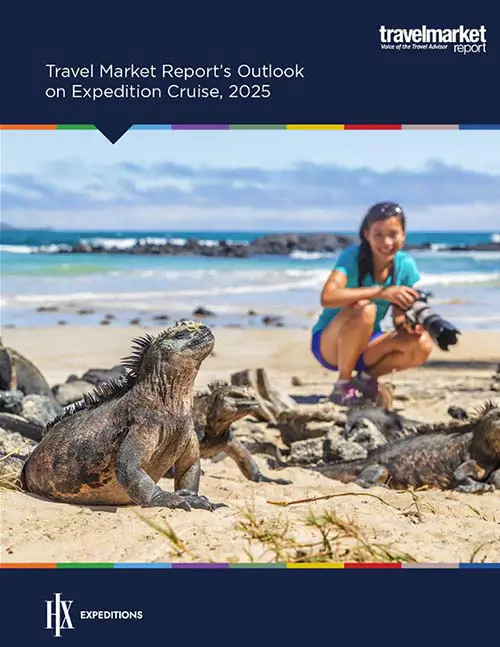Practice Qualifying, Don’t Worry About AI & Other Thoughts from CLIA’s Charles Sylvia
by Dori Saltzman
Charles Sylvia dressed as Ted Lasso, with LaShane Strum, owner of LaShane’s Travel Elites in Powder Springs, GA, at Cruise360 2023.
CLIA’s vice president of industry and trade relations, Charles Sylvia, is pretty excited about the cruise industry right now. And even more so, about travel advisors’ place within it.
“The really big headline is that more than 57% of the travel advisors here are either CLIA certified already or working on their first level of CLIA certification,” Sylvia told Travel Market Report during an exclusive sit-down interview before the second general session of this year’s Cruise360. “It’s remarkable.”
It’s further proof of how committed CLIA-member advisors are to maintaining a professional community, and differentiating themselves from other advisors, he added.
“There are 141,000 travel advisors in the United States and Canada and in this day and age, it’s really about competitive advantage. It’s about differentiating yourself,” he said. “They can point at CLIA [certification] and say, ‘Hey, look this is my Good Housekeeping Seal of Approval. I worked hard for this certification into it. I put years into it and the worldwide cruise industry trade association has certified me as an expert in cruise travel. That is why you should book your cruise with me.'”
Tout Your Expertise & Service
Sylvia emphasized how important it is for advisors’ to call out their expertise to potential clients.
“It’s not just about specializing in a product but claiming your expertise. The first person who will ever call you an expert is you.”
Part of claiming that expertise is getting out on ships for inspections and sailings, and attending educational opportunities.
“What really excites me is a great number of the travel advisors who are here bounce from ship to ship to ship to resort to ship. They’re everywhere, and they’re booking travel and building a business.”
He said that drive to claim their expertise is what’s behind the fact that 500 of the more than 1,000 advisors who attended this year’s Cruise360 were new to the event.
It’s not only their expertise advisors should be calling attention to. It’s the service they provide. Service they can’t get anywhere else.
“We want to always remind our clients of the value that we’re offering them. It can be done very nuanced, in subtle ways. I always encourage travel advisors to, at the point where they’ve done something special for their client, to just gently explain what they’ve done on their behalf and end the explanation with ‘this is what I do for my clients.’ That way the client understand that they’re receiving value that they wouldn’t normally receive if they had booked directly.”
Service Trumps AI
This personal touch is why Sylvia told TMR he doesn’t think travel advisors need to be worried about artificial intelligence taking their jobs.
“This is a person-to-person business. There’s human interaction and reassurance that no machine will ever be able to do,” he said.
As an example, Sylvia talked about a client he’s sending on her first Mediterranean cruise. His client will be traveling with her 80-year-old mother and has some concerns.
“I call her every week. She’s not sailing for another eight weeks, but I call her every week at the exact same time to check in… We talk about different things and she has different questions and she knows that on a Wednesday at 3:15 she can always count on my call.”
Practice, Practice, Practice
Part of the expertise that Sylvia says is vital to an advisor’s business is the ability to match the right client with the right product.
Unless you’re new to the business, most advisors know that means taking prospective clients through a list of qualifying questions. But, he said, doing it the right way takes practice.
“We don’t want it to be like an interrogation. We want it to be a nice conversation.”
Sylvia recommends that advisors practice qualifying people by doing it with friends and family. And, he emphasizes, record yourself doing it so you can listen back and see how you might change your process.
“The more you practice qualifying and get sharp at qualifying, the better you’ll match that future client with the right cruise product.”
Finding New-to-Cruise Customers
Go to any cruise-related conference and the cruise lines will talk about how important it is to find new-to-cruise customers and how they’re relying on advisors to help with that.
TMR asked Sylvia how he goes about finding new-to-cruise clients.
His answer? Groups.
“I host groups of new-to-cruise clients. People who have slight trepidation about going on a cruise because they’ve never done it before. I say to them, come with me. Let me take you on your first cruise. I’ll be on the ship if you need me, but I won’t be with you. I’m taking 25 couples with me, enjoy your own cruise experience… and I will be there for you if you need me. I built my business that way,” he said.
Finding those groups, he said, starts with looking through your database for existing cruise clients. Then asking them if there’s somebody that they’d want to be able to share their cruise experience with.
“They always reveal to me, almost every time, someone that they know, either a relative or a friend, who they’d love to cruise with but who’s never been on a cruise. They make the introduction and then I do my thing.”
























